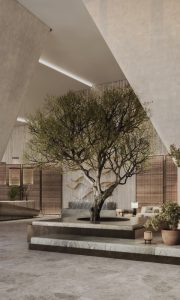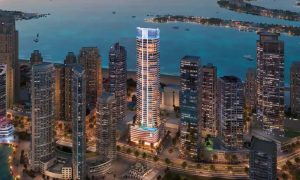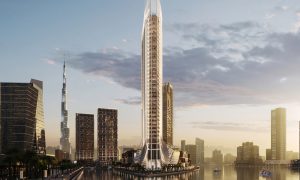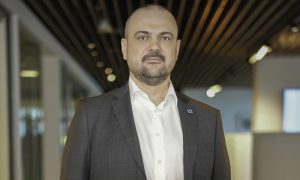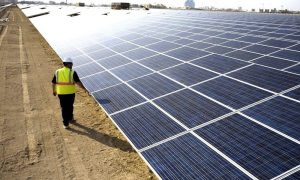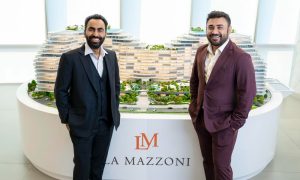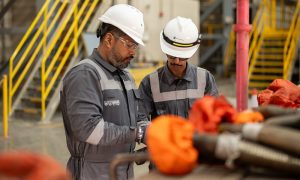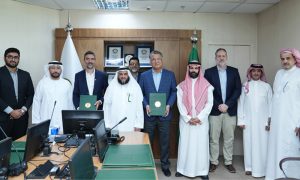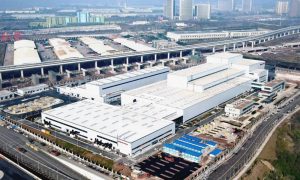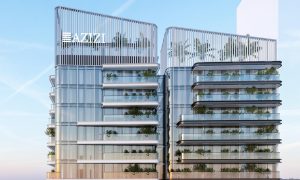Select Group’s Rahail Aslam: Making the most of Dubai’s property slowdown
Why a tough market can bring opportunities too

Good business leadership means you have to stay one step ahead of the market and the competition when it comes to making critical decisions about the future of your company. A CEO who second guesses himself when it comes to the crunch is of little use.
Having the vision and strength of conviction to make the hard choices in moments of great stress is what sets the best apart from the rest. Those choices don’t have to be revolutionary or game-changing. In fact, more often than not, it’s about having the confidence to trust the business strategy that you’ve put in place.
Someone who knows more about this than most is the CEO of Dubai real estate developer Select Group. As the man behind some of Dubai Marina’s most high-profile projects, Rahail Aslam is well versed in making tough choices in turbulent times. With the company setting up shop in 2002, Aslam has overseen its growth as a luxury real estate developer through some of the most challenging market conditions Dubai has ever seen.
Between 2005 and 2007, the company launched seven projects in Dubai Marina, starting with The Torch tower. Despite being firmly in the middle of the storm when the financial crisis hit, Select Group managed to deliver all the projects between 2009 and 2012, without any major delays.
Although it’s been about four years since then and the company’s gone from strength to strength since, Aslam still remains proud of how the developer handled the tough times, telling Big Project ME that it was down to strategic planning and keeping a sharp eye out for viable opportunities. One of the key aspects of its resilience during the crisis was the building up of a ‘land bank’ that it acquired during the downturn, which gave it a steady base to build on, literally and figuratively.
In the wake of oil prices dropping and government spending slowing, many experts are now predicting that 2016 will be a tough year for the construction and real estate market, with projects likely to be delayed due to market conditions. Jones Lang LaSalle, the real estate consultancy, estimates that as much as 70% of the UAE’s pipeline real estate schemes scheduled for completion this year will fail to be delivered on time.
As ominous as this may sound, Aslam has a somewhat different take on the market, especially in light of Select Group’s business for the coming year.
“Look, capital can be a coward. When there’s negative sentiment – and it’s not particular to Dubai – markets generally soften. You can see financial markets softening and commodity prices dropping. Since real estate is also a commodity, it has also suffered.
“How does this affect Select Group? At the end of the day, our commitment is unwavering to Dubai. When we start a development here, we start with the intention of finishing it. What does this mean? It means that we put the finances into place so that we’re not subject to off-plan sales and so that we’re not subject to debt,” he explains in a conference room overlooking Dubai Marina.
“We start a project knowing that the money is in place and that we’ll finish it. At the end of the day, our project’s average cycle, from inception to completion, is anything from three to four years. Anything that happens in between is somewhat irrelevant.”
In fact, Aslam says that he prefers to view any potential slowdown as an opportunity for Select Group to do some shrewd business. Much like in 2008, the CEO says that the slowdown will allow the company to better negotiate with suppliers and procure higher quality materials at better prices. Not only is that good for current projects, but it also allows the developer to snap up opportunities that may be more complicated in better years.
“It’s a real passing storm. Things are very turbulent and dynamic at the moment [in the market]. So it’s a great time for you to capitalise, if you’ve got the appetite to invest. Post 2008, we’ve been investing in real estate. In the last 12 months, we’ve acquired several pieces of land, which will now fall into the design and development stage. We’ll be able to bring some of these projects to the market by 2017, most probably.
“The benefit of acquiring in this market is that, number one, from a developer’s perspective, you’re in a buyer’s market and you can negotiate better terms. You can take your time and look for better parcels of land. Once you’ve done that, you can move on to procurement.
“It’s a great time to be negotiating along the supply chain as well – so consultant, contractor and material procurement. That’s currently what we’re busy with. We’ve got ongoing projects that we’ve capitalised, and we’ve made investments for future development pipelines, but we’re planning and setting up the supply chain.
“So all in all, I’d say that we’re in a very fortunate position and it’s a very interesting time.”
In addition, Aslam has been adamant that the company expand its portfolio of offerings to the market. While residential real estate is still the primary focus, since 2009 the company has been exploring different avenues, primarily in the hospitality sector and in new geographic locations, so as to have income-producing assets.
“Residential development is a very cash-intensive business and there’s no immediate returns. Eventually, you’ll get your developer profit on it [but it could take years]. So we decided to diversify geographically and in our types of business. It’s still real estate, but we’ve gone into hospitality and income-producing assets.
“We own InterContinental Dubai Marina, that’s wholly owned by the group and it’s fully an income-producing asset. We’ve also got a hotel in Birmingham – the Radisson, which is also fully owned by the group and is income-producing.
“And we’ve got several hundred apartments in the UK in regional cities. All of them are producing income. So there’s no development per se, it’s pure asset management and recurring revenue. Therefore we’ve got geographic diversification, currency diversification, and it’s non-development related.
“On top of that, the hospitality element of the group is growing. We’ve just signed with the Jumeirah Group, we’ve got the InterContinental and we’ve got the Radisson. There are also plans to have another two hotels in the group before 2018. Diversification is in play every year, and we’re doing what our strategy says.”
For the immediate future, however, the focus of the group will remain on current projects, especially one in particular – the massive Marina Gate project, which is set to be the company’s flagship project once complete. As previously described in the September 2015 issue of Big Project ME, Marina Gate is a $1.08 billion three-tower project that will consist of high-end residential and retail, with a total built-up area of 371,612sqm.
“You’ve got Marina Gate 1, 2 and 3. Marina Gate 1 is projected to complete in Q3 2017, and currently it’s on eight floors. It’s on time in terms of project delivery, and we monitor it on a weekly basis both in terms of programme and progress.
“As for Marina Gate 2, shoring and piling is complete. Excavation works is now ongoing and it’s scheduled for delivery in Q3 2018. There’s been no changes to that, at this stage of delivery. Marina Gate 3 has commenced construction as well, but we haven’t done any sales yet. However, our commitment is to deliver it in Q3 2019,” Aslam tells Big Project ME.
Despite the success the developer has had in Dubai Marina, he does concede that it may become difficult in the future to continue focusing on the area, given the limited space available. However, he says that for the time being he’s content to focus on the area, for multiple reasons.
“In terms of our focus on Dubai Marina, Emaar doesn’t develop here anymore, and there’s very little land parcels here, so there’s very little competition. If you look around, there’s hardly any new developers around. So we’re quite fortunate that we’re not dealing with too much competitiveness here.
“[However], as I mentioned earlier, we’ve acquired land and we’re going to hit the mid-income bracket. We’ve got several projects in the design stage, and subject to market sentiment, we’ll bring those projects to market in late 2016 or early 2017. Needless to say, we’re designing those projects at the moment, and we’ll start construction and eventually bring them to sale. So we’ve got a strong pipeline to the future.”
It’s because of this pipeline that Aslam says he will hold off on pushing Select Group into new territories and markets, despite the success of the group’s UK and European ventures (the developer has a property in Ciovo, Croatia).
“Our plans are already embedded in what we already do. We’ve secured a future pipeline for Dubai, and in terms of entering other GCC markets, my view on that is two-fold. We’ve been in Dubai since 2002, doing real estate. There’s always a learning curve when you enter into any market and this place is no exception. We’re well established here, we’ve got a strong brand and a strong track record.
“Now, if you export to other markets, you don’t get that same traction. So our view has been to focus on our key markets, which is Dubai and Europe. To be honest, there’s no intention of doing anything in the GCC at the moment.”
The key to the company’s success, Aslam says, is the strong relationships it builds with the construction industry. Unusually for a developer, especially a private developer, Select Group prefers to work with a preferred list of consultants, contractors and subcontractors on projects.
He explains that this comes from a desire to work with partners who are the best-in-class, but also because when it comes to working on large projects like the Marina Gate, it is pivotal to have a good supply chain that you know and trust.
“We make great efforts to work with the contractors and consultants before awarding the contract; we spend an exhaustive amount of time understanding each other’s requirements,” Aslam explains. “[That way] you also find out who’s going to work on the project [from the consultant and contractor]. That way you don’t have issues afterwards, from start to finish.
“Once you’ve made that commitment that you’re going to work together, you work towards that positive outcome. That means a continuous improvement model that you unblock issues on a daily basis and you don’t let conflicts build up.”
Quite understandably, that sort of approach is welcomed by contractors and consultants, as it saves them from any issues further down the line. Given the success of this approach – and the contractors and consultants Big Project ME has spoken to have been unanimous in their praise for Select Group – it is easy to wonder why more developers don’t follow suit.
“There are a lot of developers who get entangled in conflicts. It just slows the job down. Our view is that, whatever the issues are, bring them to the table, resolve them and then move on so that the project and relationships are not harmed,” Aslam asserts. “Then your interests are aligned, because a contractor wants to finish a job and the developer wants him to finish the job.”
“And the next time around, when you’re building again, you’ve already established that working relationship and reputation. If you pay a contractor on time and if you deal with issues quickly and effectively, then they’re going to appreciate that, and the next time you want to float a job, maybe they’ll reflect that in the price,” he grins, as the interview comes to a close.
